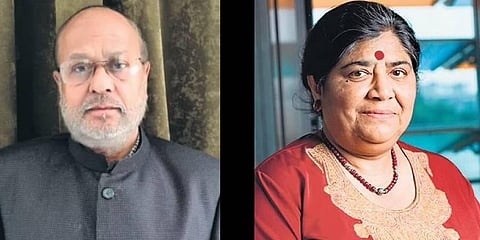

A debate is raging in the country on re-writing history and the role of historians in presenting historical facts. Kavita Bajeli-Datt speaks with renowned historians from two different streams: Prof Mridula Mukherjee, who has taught history at the Centre for Historical Studies, JNU for over four decades, and Prof Makkhan Lal, archaeologist and historian, who taught in BHU and AMU on the narrative accompanying the debate. Let’s begin with Prof Makkhan Lal, founder director of Delhi Institute of Heritage Research and Management.
Are we witnessing an overhaul of the historical narrative in the country? Why is it happening?
I don’t see an overhaul of the narrative or history. History has always been written and rewritten. Before Independence, there were three mainstream historians – imperialist historians (British viewpoint), Marxist historians and nationalist historians. Right from Nehru to Indira Gandhi, Left historians dominated the discourse. This was because they occupied crucial positions within the government or government-funded bodies.
Yet there was always an alternative view of history writing, which was labelled communalist. The situation has now changed. Left patronage has gone. This is discomforting for the Left and their sympathisers. That’s why it is being said that overhauling is going on. With changing times, perspectives change.
History has always portrayed Aurangzeb as a tyrant. Why have we made him so prominent?
Hitler, Mussolini, Stalin are not respectable names. Yet modern history discusses them. We have to discuss Aurangzeb -- how he treated his people, how he harmed non-Islamic people, and forcibly converted them. We as a nation should know how many temples Aurangzeb destroyed.
Should we see ancient Indian history from the viewpoint of temples’ destruction? Will it affect constitutional harmony?
Where is the constitutional harmony when you don’t have a uniform civil code? It is constitutional anarchy. India is the oldest living civilization in the world. Destruction of temples is part of history. Those who became Muslims have forgotten that their ancestors were Hindu. There are 3,700 temples that were demolished and mosques were built on them. We have always asked for three temples — Ram Janmabhoomi, Kashi and Mathura shrines.
India was a liberal society. Why was a right-wing perspective absent from public discourse?
Liberalization is part of its civilizational ethos. Liberalism doesn’t mean you allow yourself to be wiped out. Arms have to be taken up by liberal society when its own existence comes into question. There were many eminent writers and books written, but they are now more visible because of social media and technology.
Prof Mridula Mukherjee. (She was director, Nehru Memorial Museum and Library, from 2006 to 2011, and Dean, School of Social Sciences, JNU from 2012 to 2014) Post-Partition India focused on bringing communities together.
A certain kind of history was presented. Were certain facts suppressed?
There was no official attempt to direct the kind of history that should be written. Historians were free to research and write and teach. However, at the level of school textbooks, a concerted effort was made to get first-rate historians to write for children. The effort was also to write history free from colonial bias.
If the selection of facts was non-partisan, why is it coming out in such a violent narrative?
This is a contrived narrative, motivated not by a desire for a more objective history but by political agendas.
It is often said a right-wing narrative was not allowed, and that’s why there is a churning now.
Non-communal historians can’t be faulted if there were not enough takers for a right-wing communal narrative. The notion that some historians conspired to keep out those with opposite views is a product of a fertile imagination.
Was it a mistake in not portraying the invaders in a proper perspective?
No, I don’t agree. All these so-called new facts were known for a long time. British colonial history books were always talking about ‘Muslim tyranny’ over Hindus to justify their own rule. To the Hindus, they said, ‘we saved you from Muslim tyranny’, to the Muslims they said, ‘if India becomes independent and we go away, Hindu majority will rule over you’. That was the policy of ‘divide and rule.’
Do you agree history is written by whoever is in power?
If this were true, no worthwhile history would be written anywhere. Indian historians have written history according to the rules of the discipline and the profession. That is why their work is respected across the world. How is it that the so-called Left historians, such as Irfan Habib, Romila Thapar, Satish Chandra, RS Sharma, and Bipan Chandra, who are sought to be demonised today are respected all over the world? Their works sell in thousands even today despite being thrown out by the National Council of Educational Research and Training two decades ago.